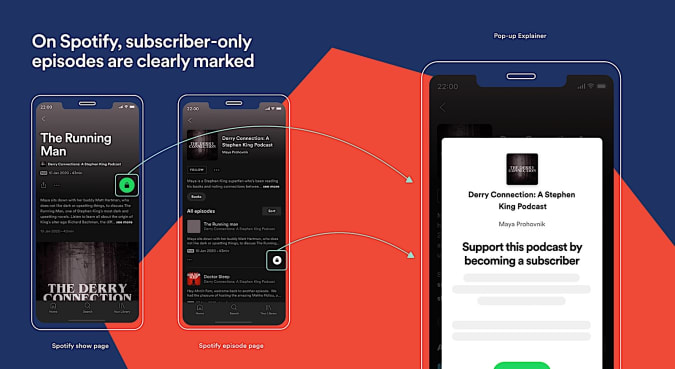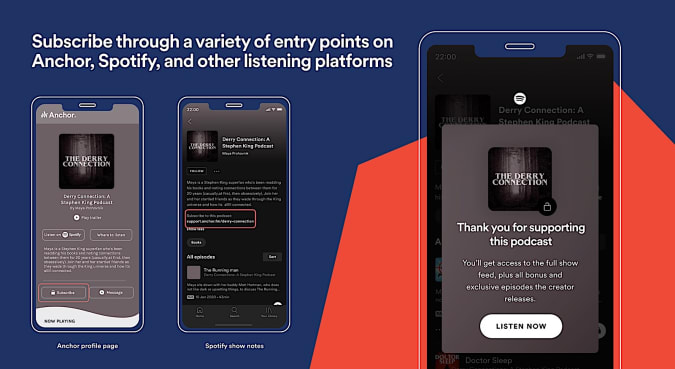
Spotify’s plan for paid podcast subscriptions
[ad_1]
Almost immediately following Apple’s announcement of a paid podcast subscription platform last week, reports began to circulate that Spotify would soon announce details on a service of its own. The company said it would test paid subscriptions back in February, but today it made things official. Spotify has announced a paid subscription platform that allows podcasters to charge extra for exclusive content. The big difference this and what Apple has proposed is that Spotify won’t take a cut for the first two years except for transaction fees. And when it does ask for its share, it will only demand five percent of the revenue.
Spotify’s program will be accessible through Anchor, the all-inclusive podcast production platform it bought in 2019. Creators can designate specific episodes as subscriber-only before publishing them to Spotify and other platforms. For creators who host podcasts elsewhere, the company says it’s working on technology that would allow existing listeners to use that log-in information to stream subscriber-exclusive items on Spotify. The company isn’t offering much info there, but it says more details on partners and features are coming soon.
In the Spotify app, paid content will be “searchable and discoverable” like any regular episode. Those episodes that require a subscription will still appear in a show’s feed, but they’ll be labeled with a lock icon on the play button. If you choose to support a show, you can do so on its Anchor profile page or via link in the show notes on Spotify.

Spotify
As you might expect, Spotify is pitching paid subscriptions as a good thing for both creators and listeners. “Listeners will be able to tune in knowing that their subscription is going directly to the podcasters they love, giving independent creators a revenue stream on their own terms,” the company explained in blog post. And for anyone producing a show, the company says paid content will allow them to “maximize their subscription audience and grow it from their existing listener base.” Most podcasters rely on ad money for revenue, unless they publish exclusive content for listeners who support them directly through sites like Patreon. Spotify is now offering its own alternative, so long as you don’t mind publishing through Anchor. The company also has its own ad platform it has spent years building — another piece of the podcast revenue puzzle it can offer.
Of course, Spotify is also giving podcast creators an alternative to the subscription platform Apple just announced. Apple requires a $19.99 annual fee for its Apple Podcasters Program. It will also take a 30 percent cut of subscriptions for the first year and 15 percent afterwards. While Apple’s version isn’t a one-stop shop like Anchor is already set up to be, the company will offer analytics, episode management tools and other features that will help creators stay organized.

Spotify
Spotify is already working with 12 independent podcasters to leverage the subscription option. Spotify says it selected these shows based on how “uniquely positioned” they were to leverage the platform’s potential. The company is also accepting applications for a waitlist and it plans to open up access to more podcasters “in the coming months.”
One of those producers is NPR, and the public radio broadcaster will offer some of its shows ad-free for paid subscribers. Starting May 4th, How I Built This with Guy Raz, Short Wave, It’s Been a Minute with Sam Sanders, Code Switch and Planet Money will be available as part of the initial launch. Versions of the shows that are available without sponsors will have “Plus” added to the end of their titles (Code Switch Plus, for example).
Apple’s version of paid podcast subscriptions is going live in May and it didn’t mention any waitlist or application process. What’s more, Apple’s podcast subscriptions will be available in 170 regions and countries at launch. Spotify’s podcast subscriptions are rolling out in the US today. The company plans to expand the program internationally “in the coming months.”
All products recommended by Engadget are selected by our editorial team, independent of our parent company. Some of our stories include affiliate links. If you buy something through one of these links, we may earn an affiliate commission.
[ad_2]
Source link







